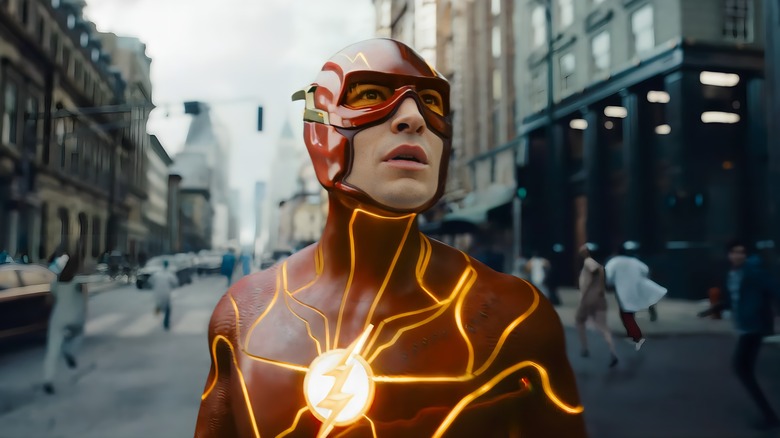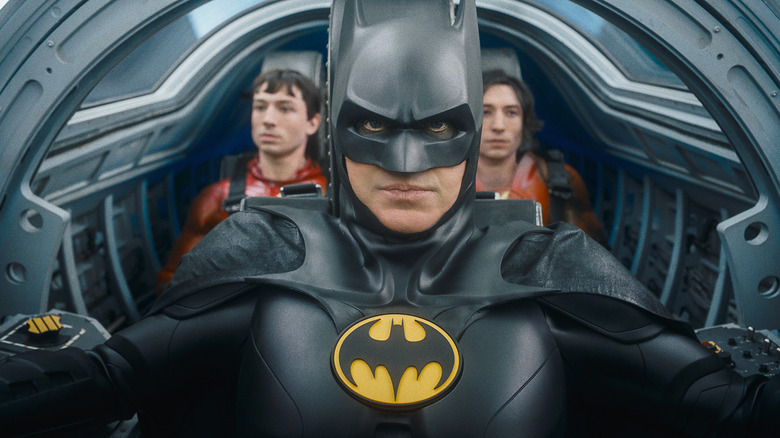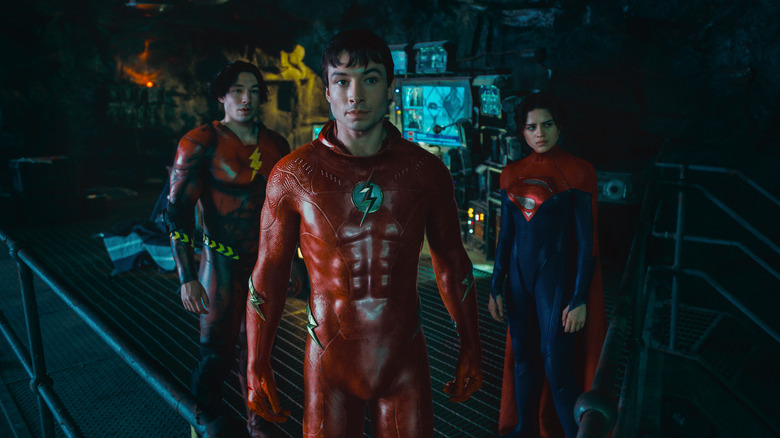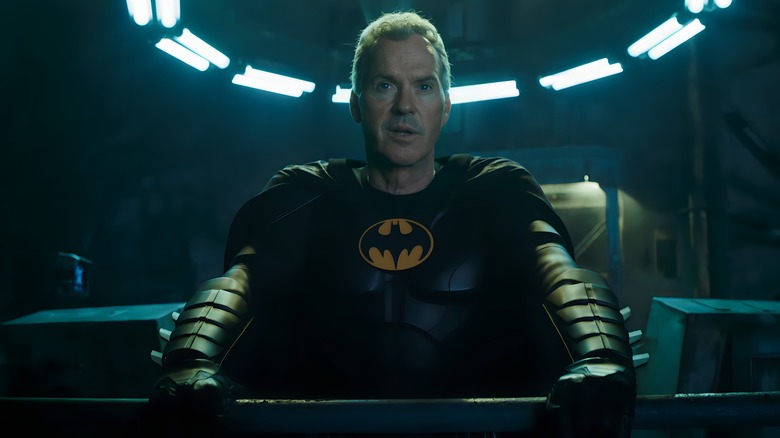The Flash Crosses The Global Box Office's Finish Line - So, Is It Really A Flop?
It's over for "The Flash."
As schools around the nation open their doors and the weather becomes chillier, the summer movie season is wrapping up. After the COVID-19 pandemic, the box office is continuing to rebound. As of this writing, the 2023 box office is higher than 2022's receipts by nearly 25%, per Box Office Mojo. Overall, this year's domestic haul stands tall at $6.5 billion. While these aren't pre-pandemic numbers, a number of tentpoles this summer, namely "Barbie" and "Oppenheimer," have compelled audiences to return to the multiplex. And while 2023 is filled with success stories at the box office, it's also riddled with failures and bombs that Hollywood will never forget.
One such case is Warner Bros.' long-gestating "The Flash." Initially announced in 2014, the Ezra Miller-led flick finally debuted in mid-June this year and was essentially dead on arrival. On paper, the film was the perfect cinematic outing for even the most casual DC fans. It featured the return of Michael Keaton's Batman — whose debut 1989 flick made a whopping $250 million stateside, as well as the introduction of Supergirl, played expertly by Sasha Calle. And if the early hype was to be believed, then "The Flash" would have emerged as one of the best comic book films of all time.
A multiverse narrative with compelling cameos and surprises, the marketing for "The Flash" pitched this as "Spider-Man: No Way Home" for DC fans. But unlike the "Spidey" threequel, which wrapped up its global run with $1.9 billion in late 2021, the Andy Muschietti-directed "Flash" barely conjured up a $270 million global haul. With a domestic total of $108 million and an international cume of just $159 million, "The Flash" is one of DC's biggest box office flops.
The Flash's disastrous domestic run
According to The Numbers, "The Flash" has wrapped up its theatrical run stateside. The film debuted with an impressive 4,200+ theater count on June 16. More screens didn't lead to stellar receipts, as the film fizzled with a $55 million debut domestically, averaging $13,000 per theater. While it opened at number one at the box office, the film did face some competition. "The Flash" opened alongside "Elemental," which debuted to a haul just shy of $30 million. Pixar's latest was originally deemed a bomb, just like "The Flash," only for "Elemental" to pick up steam thanks to positive word of mouth. To date, the animated flick has grossed over $460 million, emerging as a viable success for the House of Mouse.
"The Flash," however, did not boast positive legs, forcing the Michael Keaton and Ezra Miller-led film to crater in its sophomore weekend. With a second weekend haul of $15 million, it was immediately clear to pundits that "The Flash" simply didn't have the momentum needed to sustain a profit. By its third weekend, Miller's first solo outing as Barry Allen was taking hold of the number 8 spot at the box office, facing unlikely competition from the likes of Jennifer Lawrence's "No Hard Feelings" and the animated "Ruby Gillman, Teenage Kraken."
During its fifth weekend, "The Flash" managed to have a hold on less than 800 theaters. By August 17, just over 60 days after its release, the film was playing in just 16 theaters in the United States and Canada, making a per-theatre average of $12 — the average cost of one ticket. As of August 29, the film has all but evaporated from cinemas, already available to stream on the Warner Bros.-backed streaming service Max.
Digesting the domestic Flash numbers
"The Flash" ended its domestic run with a haul of $108 million — nothing sort of a disaster. What makes these numbers particularly disheartening is how much faith Warner Bros. had in this picture. While the film failed to live up to the hype set up by early reviews — and the expectations set by Tom Cruise and Stephen King, it wasn't a complete critical misfire. The film has a semi-decent 64% rating from Rotten Tomatoes critics and an 83% score from verified audience members. In short: "The Flash" isn't operating at the same critical level as prominent superhero bombs like 2015's "Fant4stic."
Beyond that, Warner Bros. made consistent efforts to market the film as efficiently as possible, believing they had a genuine hit on their hands. The studio debuted the first look at their latest DC project during the Super Bowl, creating a trailer that strategically put Michael Keaton's Batman front and center. It was an explosive trailer — one that logically showed off the film's cameos and set pieces while teasing an epic multiverse narrative. Coupled with the goodwill elicited from early screenings, Warner Bros. aggressively pushed the film, hosting multiple (free) fan screenings just weeks before the project's release to drum up social media chatter.
Clearly, none of that worked, as "The Flash" doesn't even boast a mediocre box office run for a superhero flick, like the $400 million haul from 2021's "Eternals" or the "Man of Steel's" $668 million total. DC's latest was simply treated with indifference, something signaled by its 72% drop during its sophomore weekend. Social media buzz, mixed-to-positive reviews, and a strategically placed Keaton appearance weren't enough for domestic fans of the iconic hero, so how could it be compelling for those abroad?
International audiences didn't care for The Flash
International audiences have always saved big-budget, action-focused spectacles from domestic doom and gloom. "The Meg" is the perfect example of an action-heavy flick that soared thanks to its over $380 million international haul, fueled largely by China. For a superhero flick, one can look at Marvel's "Ant-Man and the Wasp," which nabbed over 65% of its $620 million+ haul from international markets. While the United States and Canada might be the creative home for superheroes, international audiences have always appreciated Hollywood's interpretations of iconic characters.
"The Flash" has an international total of $159 million, a number that's significantly lower than the $223 million foreign haul brought in by Dwayne Johnson's "Black Adam." Note that Johnson's maligned DC outing didn't even receive a release in China, unlike "The Flash." In the Middle Kingdom, Ezra Miller's solo flick only nabbed $27 million — a far cry from the near $300 million total that 2018's "Aquaman" brought in. Besides China, the film received a $19 million total from Mexico and $11 million from the United Kingdom.
Compare these minor hauls to recent superhero films and the failure of "The Flash" becomes even more pronounced. Compare these numbers to non-superhero films, with smaller budgets and less prevalent IP recognition, and the disappointment of DC's latest is eye-widening. 2022's "Puss in Boots: The Last Wish" raked in over $299 million internationally, despite competing with James Cameron's "Avatar: The Way of Water" during peak holiday time. Even this year's R-rated "John Wick: Chapter 4" boasts higher international receipts than "The Flash."
International audiences barely took notice of "The Flash," instead choosing to prop up "Spider-Man: Across the Spider-Verse" and "Elemental" at the box office — both have foreign totals north of $300 million.
Why did audiences reject The Flash?
Why did international audiences reject "The Flash"? The same reason why domestic audiences did: pure indifference. Despite trying its best to function as a crowd-pleasing film that speaks to all demographics, audiences who weren't invested in DC had no reason to show up for "The Flash." Take a look at DC's box office returns over the last few years and it's obvious that audiences are growing indifferent with each subsequent release. "Shazam! Fury of the Gods" wrapped up with a $132 million haul and 2021's "Suicide Squad" barely crossed $170 million worldwide.
As the years have gone by, audiences have had little to no interest in DC's vision for a shared universe. Instead, they've become receptive to stand-alone, grounded offerings fueled by singular voices. 2019's "Joker," for all its controversies, was a billion-dollar R-rated grosser. And 2022's "The Batman," which was helmed by Matt Reeves, had receipts north of $765 million. While it's unfair to call DC a tainted brand, their totals speak for themselves, especially after "Aquaman." And while superhero projects are no longer as favorable as they once were, Marvel is still able to pull solid numbers from its expansive fan base. But the fatigue has definitely manifested, and audiences are ready to vote for their wallet and ignore projects that aren't must-watches in cinemas. It happened with Marvel this year — the maligned "Ant-Man and the Wasp: Quantumania" grossed $463 million worldwide, while the critically acclaimed "Guardians of the Galaxy Vol. 3" soared high with a total shy of $850 million.
Despite decent marketing, "The Flash" just didn't speak to audiences. If the film had lived up to its pre-release hype, it's possible that this film could have legged out like "Elemental." Instead, it was merely watched by DC's hardcore fanbase, which seems to be disinterested in every new release.
The Flash is another box office flop for DC
Perhaps the narrative intentions of "The Flash" were misguided. While folding Michael Keaton in was a strategic play, it may have been a poor decision to center most of the marketing surrounding his inclusion, especially when one considers that his rendition of Batman is particularly popular with older audience members. Older audiences haven't been returning to cinemas as frequently as younger viewers, meaning they're far more selective with their viewings. However, older viewers did show up for "The Flash," with 70% of the film's opening weekend audience being over 25. This means that most families and teenagers skipped "The Flash" — a superhero movie quite literally meant to appeal to all demographics.
Internationally, Keaton's Batman just doesn't have the same clout as he does stateside. Unlike "Spider-Man: No Way Home," which featured the returns of Tobey Maguire and Andrew Garfield, the legacy characters of "The Flash" just don't have the same foreign appeal. If marketing is focused on a character you have no reverence for, chances are that you'll skip the project.
Ultimately, "The Flash" barely managed to cross over $270 million worldwide — a total that's shockingly low in what's still considered to be the golden age of superhero cinema. With a budget of $200 million, not accounting for marketing spending, per The Hollywood Reporter, "The Flash" is a box office disaster for DC. While it's unclear how much the film will lose at the box office, box office analyst Luiz Fernando doesn't rule out a loss north of $200 million. While it's difficult to pinpoint exactly what went wrong for "The Flash," the project will likely remain a sordid reminder for Warner Bros. as they continue to move forward with James Gunn's vision for the DC franchise.





